The spirit of 1971: On India-Bangladesh relations
India and Bangladesh must focus on future cooperation based on past partnership
Bangladesh Prime Minister Sheikh Hasina’s ongoing state visit to India and meeting with Prime Minister Narendra Modi have resulted in positive outcomes and seven agreements, which include the conclusion of the first water sharing agreement in 26 years, the launch of free trade agreement talks, and infrastructure projects particularly in the railways sector. The water sharing agreement on the Kushiyara, which was preceded by the first Joint River Commission meeting in 12 years, is a particularly hopeful sign on resolving water management, and a very contentious issue, of 54 trans- boundary rivers. While there has been a smaller agreement on the withdrawal of 1.82 cusecs from the Feni in the interim period, the Kushiyara agreement is the first time the Centre has been able to bring on board Assam and other north-eastern States, for the agreement since the 1996 Ganga water treaty. However, the Teesta agreement, of 2011, held-up by West Bengal, remains elusive, a point Ms. Hasina made several times. Clearly, the Teesta river agreement will require more efforts by the Modi government, and flexibility from the Mamata Banerjee-led State government, if the deal is to be sealed soon. The timeline grows more important for Ms. Hasina, who is due to hold elections at the end of next year, after three terms in office. Much of her focus was also on attracting investment by Indian industry, which now constitutes a small fraction of Bangladesh’s FDI inflows. Ms. Hasina made particular mention of two dedicated Special Economic Zones for Indian companies, coming up at Mongla and Mirsarai.
Ms. Hasina’s visit, which follows her previous state visit in 2017, and Mr. Modi’s visit to Bangladesh in 2021, have set India-Bangladesh ties on a firmer footing, and on course for closer engagement in trade, connectivity and people-to-people ties. However, the positive trend in ties goes further back, to Ms. Hasina’s advent to power in 2009, her unilateral moves to shut down terror training camps, and to hand over more than 20 wanted criminals and terror suspects to India. It is incumbent on New Delhi, which has benefited from such outcomes and the turnaround in relations with what used to be an inimical neighbour, to be equally sensitive to Dhaka’s concerns, particularly when it comes to comments made by ruling party leaders on deporting Rohingya refugees, comparing undocumented migrants to “ termites ”, the Citizenship (Amendment) Act, and more recent references to annexing Bangladesh for “Akhand Bharat”. While cross-border sensitivities in South Asia often run high over such political rhetoric, it is necessary that New Delhi and Dhaka remain focused on their future cooperation, built on their past partnership, and what is referred to as the “Spirit of 1971”.
(Source: The Hindu, it is meant for educational purposes only)
